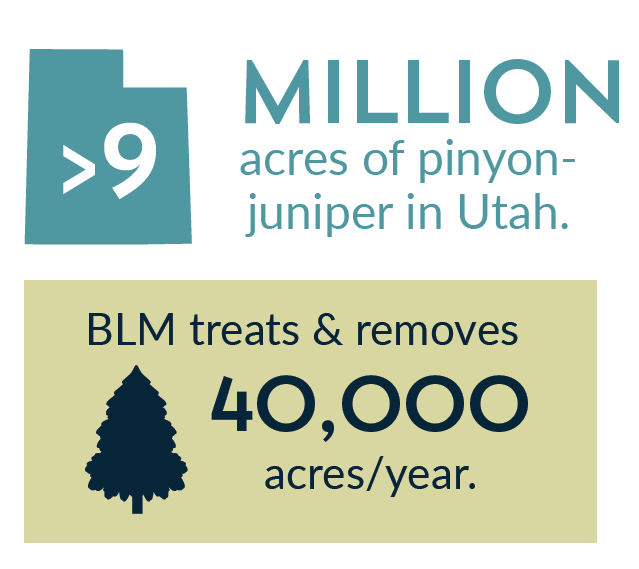Impacts - Reducing Hazardous Fuels to Improve Forest Health
Megan Dettenmaier, Darren McAvoy, Lauren Dupéy, and Michael Kuhns
Download PDFSituation

In the United States, the 2017 fire season was the most expensive in history with costs exceeding $2 billion. Because of fire suppression activities and land use changes, many trees, such as pinyon-juniper, have
expanded their range in Utah and as a result, increased fire risk and decreased forest health.
An increasingly large number of people live at the wildland urban interface, which highlights the wildfire risks
posed to private and public infrastructure. If no action is taken to reduce the fuel loads currently accumulating
in Utah forests, the costs and risks associated with fighting wildfires will increase, pest invasions may intensify
because pests easily travel through dense forests, and as a result, general forest health will decline.
USU Extension Response
USU Forestry Extension demonstrates how to use innovative, low-cost, low-tech, metal kilns to
reduce hazardous fuel loads, thin unhealthy forests, and make biochar in Utah forests.
USU commissioned the construction of four metal kilns as the basis of a DIY biochar workshop
conducted by a biochar expert to demonstrate how to make biochar. This demonstration provided
hands-on experience for 40 public and private individuals. Traditionally slash/burn piles are used
to dispose of waste wood in the forest, but this technique contains the fire in a kiln, protects the
soil because the contact with the fire is buffered by the box, improves forest health by facilitating
thinning operations for unhealthy and/or densely growing trees, and creates a valuable product
(biochar). Workshop attendees learned how to load, maintain, and quench biochar in a metal kiln,
and apply biochar (as a soil amendment) to the forest. Outputs from this project include biochar,
reduction in forest fuels, and in the long-run, healthier forests.
Impact
Since the DIY biochar workshop, the 4 commissioned kilns have been used to reduce 24 tons of hazardous fuels on Utah forest lands. They continue to be used throughout the state as both operational and demonstration tools by state, private and federal officials.
Bottom Line
Educating the public and landowners about biochar and its applications while demonstrating the feasibility of building and using biochar kilns improves the health of Utah’s forest, saves taxpayer money, and creates a valuable product, biochar.


 Utah 4-H & Youth
Utah 4-H & Youth
